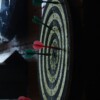Recently I walked with students among the self-portrait collection at the Uffizi Gallery in Florence, Italy. Most of these portraits were glamorous and proud, but a few were melancholy, desperate, even brutal. Some were fanciful, others despairing. Almost all faced outward as if to catch the eyes of passers-by and elicit recognition, acknowledgment, and sympathy. Famous among them are two portraits of the celebrated Rembrandt, roughly 30 years apart: in one he is an insouciant youth, in the other a squint-eyed elder with a bloated face, seeming to ask if his life has been well spent. (Rembrandt was lucky to have so many years to forge himself when many others died untimely young. This is what I, a cancer survivor, think when I see his pitted face.)
There is a strong, almost overpowering desire in the human heart to be fully seen and fully known. Maybe it is the greatest desire we have.
I think we have this desire because we are made in the image of God. And in God, Father and Son gaze upon each other and are fully, perfectly seen and fully, perfectly known in a gaze of love that has been held forever and ever.
But there is an impatient, even apocalyptic demand in every mortal human heart. It is a demand that struggles to accept time and duration as part of our lot. It says, “If I now belong to God, then it is now my right – right now! – to be fully seen and fully known! It is my destiny and duty to go, now, where I feel the joy and flush of recognition! And is my right to elicit this recognition from all the eyes that I meet!”
We forget, however, that the full sight we crave is heavenly, and for the man Jesus, such sight was painfully deferred. Moreover, we are saved by walking in His steps.
Jesus, not for one moment of His earthly life, was fully seen and fully known. Indeed, He gave up that plenitude of understanding, acceptance, and adoration in order to share our earthly fate: a fate of gazing through darkened glass and being regarded through the same.
Everywhere Jesus went He was misunderstood, distrusted, and subject to exaggeration or distortion. In the eyes of men and women, made in God’s image, He saw distantly and faintly the eyes of His Father, but every single one of them looked at Him with incomprehension – and sometimes hate.
What pain: to be keenly, constantly reminded of the intimate Heaven, the intimate recognition, you have lost!
And yet.
Jesus didn’t complain about that.
He said, “Father, not my will but Yours be done.”1 And He forsook the search for a loving, answering gaze, cast His eyes humbly downward, and went about His unsung work. He shared willingly in our ego-deprivation.
We all seek a mirror – a trustworthy reflection that will tell us who we are and how we “look.” But such a mirror cannot be found on earth. Therefore, Jesus did not look for such a mirror in human faces (“he knew what was in the hearts of men”2 ). Instead, He let the Father lead Him as if He were blind, with a yoke steered from above and behind, where the eyes cannot see.
It was not heavy. (“My yoke is easy and my burden is light.”3 )
Oh, to be released from the burden of worldly self-consciousness, where we seek approval and valuation in the eyes of women and men! Oh, for the freedom to be guided blindly by the gentle hand of the best ostler, the best pilot, that little creatures like us could hope for, until the measure of our days is done.
It helps me never to think of “I,” or “my,” if I can help it. For me, words like that are inevitably tinged by the narcissism of this land of broken mirrors.
I don’t want the burden of an “identity” whose observance I police, and whose recognition I crave, as I glance furtively among the appraising eyes of my human brothers and sisters. I want only the motive force of the Holy Spirit at my back, to which I am completely surrendered, without looking around and second guessing.
In fact, as I get older, I realize I do not know how to be “myself.” It is not my earthly lot to know this, I think. Instead, I must empty myself as Jesus Himself did, that the Father might gently guide and sculpt – sculpt me, sculpt everyone – into a work of time, movement and change, like a living, weighty symphony or a dance, whose significance can only be known after the last note has been played.
Rather than think of myself, may I only think of You, oh Lord God, the Light and distant Face at the end of the path in this dark garden. You lie ahead, ineffable and mysterious, but your Son-self cleared a way that I might join You. May I walk upon it and not be tempted to the right or to the left. Only then, at the end, will I be fully seen, fully known. And then, truly, will I also see, with an expanded self, able to receive what You will disclose to me when You, at last, will be truly seen and truly known. Amen.
























Katie, as always, love your insights. This particular one caught my attention: “There is a strong, almost overpowering desire in the human heart to be fully seen and fully known. Maybe it is the greatest desire we have.” While being fully seen can never happen completely, I wonder how we can see others in today’s turbulent times? Perhaps, the skill of perspective-taking–or what Maria Lugones creatively calls, world-traveling–is needed now more than ever. Can we take the time to know (see them) others even if we disagree? Thanks again for spurring on our thoughts.
Katie, I always look forward to your lovely and insightful writing! Lewis (or was it Chesterton or MacDonald?) writes somewhere of the “bane of self-consciousness” in one of his essays as being a particular malady of our contemporary world. Your insights reminded me of that. Indeed, before him Chesterton writes of the perniciousness of “believing in one’s self” in his Orthodoxy. It adds to the self-emptying burden, does it not, when we truly want to fix our eyes upon Jesus and let Him shape whatever “self” we are as He pleases. Our culture is peppered with self-regarding aphorisms: being true to yourself, finding yourself, at peace with yourself, at peace with who you are, etc. And there are those perversions of self-regard such as self-hate, self-harm, and self-destruction. To be able to let go of all of that and fix one’s eyes upon Jesus is freedom indeed. Thank you so much, Katie!
Ruby Dunlap, Professor of Nursing, Belmont University, Nashville, TN